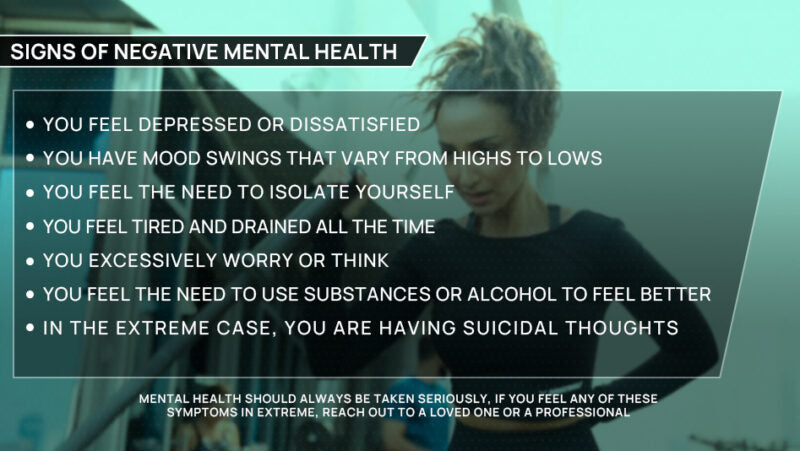The constant fear of infection, being isolated without loved ones, and a complete change in daily routines has caused many to experience negative mental health during Covid-19. Rightly so, this has been an unimaginable time in modern history.
However, evolution and perseverance against all odds is what makes us humans. Regardless of what we are faced against, it is in our nature to adapt. Even so, despite the resilient innate nature of humans, mental health is currently a global crisis.
It is estimated that around 20% of adolescents between the ages of 13 to 18 have a mental health condition. So, continuing our Ramadan series, we talked with Nadine El Ladki about mental health during Covid-19.
She talked about her experience, what she learned, and gave some essential tips on how to maintain positive mental health during Covid-19. Before we dive in directly to her advice, let’s first get acquainted with Nadine.
Also, we’ve put together a small checklist of what makes up positive or negative mental health.

Watch Nadine El Ladki's Ramadan Special
Nadine’s Mental Health Tips

Accept the pandemic
Acceptance is always the first step forward. “At the beginning, I was a bit resistant. I didn’t want to accept that Covid was there,” says Nadine as she recalls the start of the pandemic. It was tough for a lot of people.
Some had to be away from their loved ones and some were even stuck in foreign countries. You just start thinking of all the negative possibilities that can happen.
Nadine talks about how she surrendered to the idea of Covid happening. “I started talking to myself that it is here, you have to find another way to stay emotionally and mentally strong,” says Nadine. This was her way of coming to terms with the pandemic.
Conquer your fears
“Fear took over” Nadine recalls as she talks about the start of the pandemic. “The fear of getting Covid, the fear of having iftar alone, the fear of being alone, you have all these ideas in your head and you start becoming anxious,” tells Nadine.
So, you have to take a step back and calm yourself down. Again, it's just like the point above that you have to talk and explain it to yourself. Nadine explains how she did it, “you say relax, you are not alone, and you reorder the thoughts in your head and I need to face each fear one by one”.
Fighting your fears is just one of the ways to ensure that your mental health in check during Covid 19.
Embrace the change
Once the acceptance had taken place, Nadine remarked “So, then I started discovering things about myself, I started reading books, cooking more, and connecting with people that I’ve never talked to”.
Given the ample amount of time, Nadine embraced the new normal. Not only did it help to cope with her mental health, but this change also affected her professional work. She talks about how the beginning wasn’t easy because she works as a professional trainer.
“As a trainer, it is all interactive work, in the gym, you are connecting with people, and then suddenly everything is closed,” says Nadine. Now kicked in the resilience, she started doing home workouts and eventually started training through Zoom.
“And I remember the first Zoom session, I was like what am I doing? And now, I love it. It's challenging but you have to find some ways to keep going” says Nadine.
Stay active
“Try to find ways to do new things to keep yourself busy, to move,” Nadine says as she starts talking about the importance of staying active. “Don’t like just sit and do nothing because it will get you depressed even more,” remarks Nadine.
Staying active or doing light workouts is great for mental health. Exercise can help improve mental health by cutting down anxiety, depressions and improving your self-esteem.
Also, staying active at home is easy, you just need a bit of space and only your body weight to get started.
Indulge in boredom
Granted that in lockdown there will be long durations of free time. This same free time can help do wonders instead of it turning to boredom.
Nadine says “boredom is sometimes good for you as you can come up with new ideas. And you never know, while you sitting in this quarantine, you might come up with the best idea of your life”
Spot on! Converting your spare time to doing something productive during lockdown can perhaps change your life for the better. Indulging in boredom can help promote a healthy mindset.
Nadine’s Key Success

Being a practicing Muslim, Nadine has given faith a great importance when it comes to mental health.
“Without faith, I would have lost my mind because I wouldn’t have been able to conquer my fears”, says Nadine. She talks about how faith has played a great role in helping her cope with uncertainty.
For her it wasn’t just the fear of getting Covid-19, but as a provider, there is also a financial fear. Nadine talks about how “God paves the way for you”, an idea that helped her mental health during Covid-19. This belief gives a sense of relief that a higher being is watching out for you.
Faith can do wonders for mental health and psychology backs this up. In a review of 93 studies, it was found that religious people had fewer depressive symptoms.
Also, a 2013 study showed that patients responded better to treatment for depression and anxiety if they believed in God. So, Nadine is definitely on to something with her faith acting as a shield for her mental health in these adverse conditions.
Being religious gives a person a purpose and meaning to their life. Furthermore, it also helps to embrace negative events as well. Faith has helped steer mental health in a more positive direction for many people.
Shop The Perfect Ramadan Gift
Signs of Positive Mental Health

Positive mental health is about your overall mindset. The key identification is an individual feels good and can cope easily with their surroundings. The following are a few points that indicate positive mental health:
You can easily manage your mental states
Becoming sad, irritated, or anxious doesn’t mean that your mental health is starting to deteriorate. Life is like ice cream and it comes in all kinds of flavors. Hence, positive mental health is all about being able to steer through all the different phases in life.
You generally feel satisfied
It’s a general rule of thumb about life, you win some and you lose some. Being satisfied with what you have, your relationships, and your environment is a strong mental trait. This feeling of satisfaction helps you focus on what matters rather than getting stuck in thoughts that only show you what you are lacking.
You can adapt to changing circumstances
This point has perhaps been the key to maintain mental health during Covid-19. The world is drastically changing. No one expected a global catastrophe to paralyze our lives. However, acceptance is the first step in being able to move forward.
You can say “no” to people when you have to
The power of saying “no” is absolutely incredible. If you are a people person, you might have noticed how difficult it is to keep up with everyone’s request. It leaves you no time for yourself, drained of energy and often doing or saying things that you might not 100% agree with. While many of us fear the conflict after saying “no”, it also causes us to conform to extents that we may not accept internally.
Your relationships are healthy
A healthy relationship is built on trust. Apart from that, communicating is easy without having barriers in between. There is respect for one another and respect for each other’s boundaries. Another sign of a healthy relationship is, sharing what is important to you without negativity.
You have good self-esteem
When your self-esteem is healthy, it's easy to express your needs confidently. It is easier for you to cope with any losses or stress. You are also less likely to be overcritical of yourself. Confidence and assertiveness are other factors of good self-esteem.
Signs of Negative Mental Health

You feel depressed or dissatisfied
Depression is an elongated sadness. A general rule of thumb is that you feel sad or irritated for at least a few weeks. Apart from being sad, you also feel a lack of motivation to do anything. This usually results in losing interest in what you once enjoyed.
You have mood swings that vary from highs to lows
Dramatic changes in moods are also another sign of negative mental health. While we’ve all experienced an emotional outburst in our lives, constantly varying from anger to sadness can be a tell-tale of deteriorating mental health.
You feel the need to isolate yourself
We aren’t meant to live alone; we are meant to co-exist together. Feeling the need to isolate from our friends and family is another sign that something is wrong.
You feel tired and drained all the time
Regardless of how much you sleep, your energy levels aren’t being replenished. If you have insomnia or are oversleeping, then this may be because of your mental health. Even feeling that moving your body is now an immense task, can be a symptom of depression.
You excessively worry or think
Thinking negatively about yourself or constantly putting yourself down is one of the signs of low-self-esteem. You can also start having problems with your concentration, memory and other cognitive functions if you are suffering from mental disorders.
You feel the need to use substances or alcohol to feel better
People feel the need to self-medicate themselves with alcohol and other substances to either alter their mood or to help them cope with what they are going through. However, this can lead to substance dependency and only worsen the symptoms. Drug and substance abuse is not a viable treatment for mental disorders, rather it is an addictive coping mechanism which can lead to more harm.
In the extreme case, you are having suicidal thoughts
Suicide ideation can arise from extreme hopelessness and stress. Suicidal thoughts can stem from feeling that coping with the circumstances is no longer possible. Mental health should always be taken seriously, if you feel any of these symptoms in extreme, reach out to a loved one or a professional.
Nadine’s Final Message

Nadine wraps up her lovely interview with an optimistic message about mental health during Covid-19. A message that is full of hope in these trying times. “I wish for more love and more unity. I wish we get back to our normal lives and take the lessons learned from Covid with us and not take anything for granted, not even a moment in our lives.” Nadine is all about staying positive and adapting to this ever-changing world. Truth be told, this is how to get ahead in life without compromising on your mental health.






